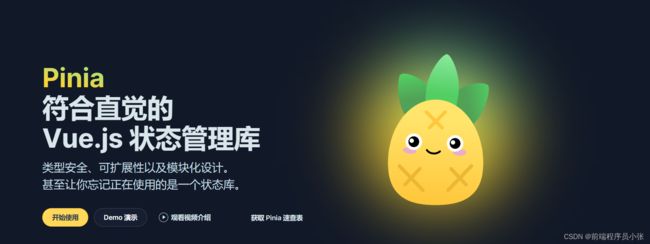【Vue全家桶】Pinia状态管理
【Vue全家桶】Pinia状态管理
文章目录
- 【Vue全家桶】Pinia状态管理
- 写在前面
- 一、认识Pinia
-
- 1.1 认识Pinia
- 1.2 为什么使用Pinia?
- 二、 Store
-
- 2.1 定义Store
- 2.2 Option对象
- 2.3 setup函数
- 2.4 使用定义的Store
- 三、Pinia核心概念State
-
- 3.1 定义State
- 3.2 操作State
- 3.3 使用选项式 API 的用法
- 四、Pinia核心概念Getters
-
- 4.1 认识Getters
- 4.2 访问Getters
- 4.3 向Getters传递参数
- 五、Pinia核心概念Actions
-
- 5.1 认识Actions
- 5.2 Actions执行异步操作
- 5.3 访问其他 store 的 Actions
写在前面
这里是前端程序员小张!
人海茫茫,感谢这一秒你看到这里。希望我的文章对你的有所帮助!
愿你在未来的日子,保持热爱,奔赴山海!
一、认识Pinia
1.1 认识Pinia
- Pinia开始于大概2019年,其目的是设计一个拥有 组合式 API 的 Vue 状态管理库
- 目前同时兼容Vue2、Vue3,也并不要求你使用Composition API
- Pinia本质上依然是一个状态管理库,用于跨组件、页面进行状态共享
状态管理库是什么?
- 是一个保存状态和业务逻辑的实体,它会持有为绑定到你组件树的状态和业务逻辑,也就是保存了全局的状态;
- 它有点像一个永远存在的组件,每个组件都可以读取和写入它;
- 你可以在你的应用程序中定义任意数量的Store来管理你的状态;
应该在什么时候使用 Store?
- 一个 Store 应该包含可以在整个应用中访问的数据。这包括在许多地方使用的数据,例如显示在导航栏中的用户信息,以及需要通过页面保存的数据,例如一个非常复杂的多步骤表单。
- 另一方面,应该避免在 Store 中引入那些原本可以在组件中保存的本地数据,例如,一个元素在页面中的可见性。
安装:npm install pinia
1.2 为什么使用Pinia?
使用 Pinia,即使在小型单页应用中,你也可以获得如下功能:
- Devtools 支持
- 追踪 actions、mutations 的时间线
- 在组件中展示它们所用到的 Store
- 让调试更容易的 Time travel
- 热更新
- 不必重载页面即可修改 Store
- 开发时可保持当前的 State
- 插件:可通过插件扩展 Pinia 功能
- 为 JS 开发者提供适当的 TypeScript 支持以及自动补全功能。
- 支持服务端渲染
二、 Store
Store有三个核心概念:
- state、getters、actions;
- 等同于组件的data、computed、methods;
- 一旦 store 被实例化,你就可以直接在 store 上访问 state、getters 和 actions 中定义的任何属性;
2.1 定义Store
Store 是用 defineStore() 定义的
- 它需要一个唯一名称,作为第一个参数传递
- 这个名字 ,也被用作 id ,是必须传入的, Pinia 将用它来连接 store 和 devtools。
- 返回的函数统一使用useX作为命名方案,这是约定的规范
defineStore()的第二个参数可接受两类值:Setup 函数或 Option 对象
import { defineStore } from 'pinia'
// 你可以对 `defineStore()` 的返回值进行任意命名,但最好使用 store 的名字,同时以 `use` 开头且以 `Store` 结尾。
// 第一个参数是你的应用中 Store 的唯一 ID。
export const useCounterStore = defineStore('counter', {
// 其他配置...
})
2.2 Option对象
我们也可以传入一个带有 state、actions 与 getters 属性的 Option 对象:
- 我们可以认为
state是 store 的数据 (data)getters是 store 的计算属性 (computed)- 而
actions则是方法 (methods)
export const useCounterStore = defineStore('counter', {
state: () => ({ count: 0 }),
getters: {
double: (state) => state.count * 2,
},
actions: {
increment() {
this.count++
},
},
})
2.3 setup函数
与 Vue 组合式 API 的 setup 函数 相似
- 我们可以传入一个函数,该函数定义了一些响应式属性和方法
- 并且返回一个带有我们想暴露出去的属性和方法的对象
- 在 Setup Store 中:
ref()就是state属性computed()就是gettersfunction()就是actions
export const useCounterStore = defineStore('counter', () => {
const count = ref(0)
function increment() {
count.value++
}
return { count, increment }
})
2.4 使用定义的Store
Store在它被使用之前是不会创建的,我们可以通过调用**useStore()**来使用Store:
- 一旦 store 被实例化,你可以直接访问在 store 的
state、getters和actions中定义的任何属性。 - 注意Store获取到后不能被解构,那么会失去响应式:
- 为了从 Store 中提取属性同时保持其响应式,您需要使用
storeToRefs()。
- 为了从 Store 中提取属性同时保持其响应式,您需要使用
三、Pinia核心概念State
3.1 定义State
state 是 store 的核心部分,因为store是用来帮助我们管理状态的
- 在 Pinia 中,状态被定义为返回初始状态的函数
import { defineStore } from 'pinia'
export const useCounter = defineStore('counter', {
// 为了完整类型推理,推荐使用箭头函数
state: () => {
return {
// 所有这些属性都将自动推断出它们的类型
counter: 0
}
}
})
3.2 操作State
读取和写入State:
- 默认情况下,您可以通过 store 实例访问状态来直接读取和写入状态
const counterStore = useCounter()
counterStore.counter++
重置State
- 你可以通过调用 store 上的 $reset() 方法将状态 重置 到其初始值
const counterStore = useCounter()
counterStore.$reset()
变更State
- 除了用
store.count++直接改变 store,你还可以调用$patch方法 - 它允许你用一个
state的对象在同一时间更改多个属性
counterStore.$patch({
counter : 1,
age: 120,
name: 'pack',
})
3.3 使用选项式 API 的用法
// 示例文件路径:
// ./src/stores/counter.js
import { defineStore } from 'pinia'
const useCounterStore = defineStore('counter', {
state: () => ({
count: 0,
}),
})
四、Pinia核心概念Getters
4.1 认识Getters
Getters 完全等同于 store 的 state 的计算属性
- 可以通过
defineStore()中的getters属性来定义它们。 - 推荐使用箭头函数,并且它将接收
state作为第一个参数
export const useCounter = defineStore('counter', {
state: () => ({
counter: 15
}),
getters: {
doubleCounter: (state) => state.counter * 2
}
})
4.2 访问Getters
访问当前store 实例上的 getters
const counterStore = useCounter()
console.log(counterStore.doubleCounter)
Getters中访问当前store实例的其他Getters
- 我们可以通过
this,你可以访问到其他任何 getters
getters: {
doubleCount: (state) => state.counter * 2,
// 返回 counter 的值乘以 2 加 1
doubleCountPlusOne() {
return this.doubleCount + 1
}
}
访问其他store实例的Getters
getters: {
otherGetter(state) {
const otherStore = useOtherStore()
return state.localData + otherStore.data
}
}
4.3 向Getters传递参数
Getters可以 返回一个函数,该函数可以接受任意参数:
export const useUserListStore = defineStore('main', {
state: () => ({
users: [
{ id: 1, name: 'lisa' },
{ id: 2, name: 'pack' }
]
}),
getters: {
getUserById: (state) => {
return (userId) => {
state.users.find((user) => user.id === userId)
}
}
}
})
在组件中使用:
User 2: {{ getUserById(2) }}
五、Pinia核心概念Actions
5.1 认识Actions
Actions 相当于组件中的 methods。
-
可以通过
defineStore()中的actions属性来定义,并且它们也是定义业务逻辑的完美选择。 -
类似 Getters,Actions 也可通过
this访问整个 store 实例export const useCounterStore = defineStore('counter', { state: () => ({ counter: 15 }), actions: { increment() { this.counter++ } } })
5.2 Actions执行异步操作
Actions 中是支持异步操作的,并且我们可以编写异步函数,在函数中使用await:
actions: {
increment() {
this.counter++
},
async fetchDataAction() {
const res = await fetch("http://jsonplaceholder.typicode.com/posts")
const data = await res.json()
return data
}
}
Actions 可以像函数或者通常意义上的方法一样被调用:
5.3 访问其他 store 的 Actions
import { useAuthStore } from './auth-store'
export const useSettingsStore = defineStore('settings', {
state: () => ({
preferences: null,
// ...
}),
actions: {
async fetchUserPreferences() {
const auth = useAuthStore()
if (auth.isAuthenticated) {
this.preferences = await fetchPreferences()
} else {
throw new Error('User must be authenticated')
}
},
},
})
